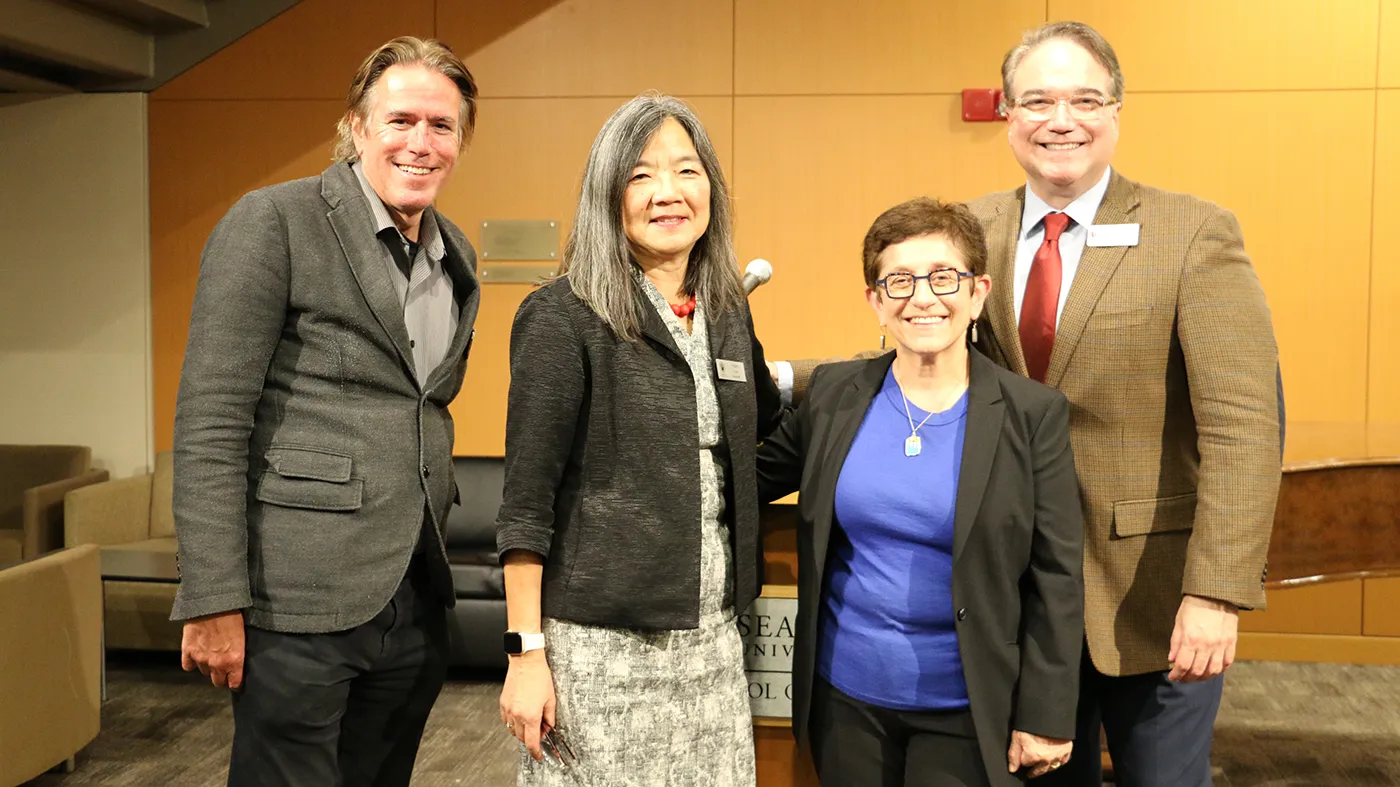It was a historic evening for Seattle University School of Law when the school launched the Technology, Innovation Law, and Ethics Program with a speech from nationally-recognized tech evangelist Gigi Sohn, the executive director of the American Association for Public Broadband.
The TILE Program, which is directed by Professor Steven Bender, associate dean for Planning and Strategic Initiatives, and Professor Margaret Chon, Donald and Lynda Horowitz endowed chair for the Pursuit of Justice, allows students pursuing a JD, Master of Legal Studies (MLS), Master of Laws (LLM), and Doctor of Juridical Science (SJD) degrees to learn about the legal disciplines and ethical principles needed for a career in one of the many technology-related areas of law.
In his opening remarks, Dean Anthony E. Varona noted that hundreds of Seattle U Law alumni work in fields of law having to do with technology, such as gaming law, communications law, cybersecurity, telecommunications law, emerging technology, and artificial intelligence, among many others.
“We are in Seattle, the global technology and innovation hub, the city of the future, and the hotbed of innovation,” said Varona.
The program’s focus on ethics — using the law to help ensure that new technology is fair and does not infringe upon people’s rights — also goes hand-in-hand with the school’s Jesuit values.
“As a nationally-leading Jesuit law school with a faculty that is number-one in the Pacific Northwest and among the top law schools nationally in terms of scholarly impact, we have the intellectual energy and firepower to illuminate the technology law areas in ways that only a Jesuit law school so rooted in social justice and ethics can,” Varona said.
Sohn spoke to attendees about her advocacy at the national level for fair and open internet. Sohn, who was nominated by President Joe Biden in 2021 to become a commissioner for the Federal Communications Commission (FCC), spent three years as counselor to FCC Chairman Tom Wheeler. Varona referred to her as “the most influential and sought-after progressive voice in tech, media, and innovation policy in the United States.”
Sohn called reliable internet access a social justice issue, noting that access to information is crucial to participating in a democracy. This was especially apparent during the COVID-19 shutdowns in early 2020, she said, when the internet served as people’s link to the outside world.
“It took a medical emergency for the public to take notice that broadband internet service, like electricity and water, is a necessity for everyone, not just wealthy and privileged individuals and communities,” Sohn said.
Despite the importance of the internet in our everyday lives, Sohn said, tens of millions of Americans do not have internet at home, including 57% of adults making less than $30,000 per year. This disproportionately impacts communities of color, rural communities, and low-income Americans. To close this ‘digital divide,’ Sohn called on the government to fund internet access for poor and rural communities, establish greater oversight of private broadband companies, and develop public broadband networks.
“To achieve social justice in this country, everyone must have a broadband connection,” Sohn said.
The TILE Program launch coincided with a gathering for alumni, many of whom are connected to the tech sector. Some have even served as adjunct professors, guest lecturers, and mentors for students. Chon thanked those alumni for their contributions to the new program.
“You are helping our TILE Program to position itself as one of the premier training grounds for lawyers entering innovation and technology practice areas,” Chon said. “We are already making a mark as one of the very few technology and law programs in the entire country to emphasize the importance of values and ethics along with competence and expertise in technology.”
Bender encouraged alumni to share their recommendations for new courses, events, and “other ways to infuse technology, innovation, and ethics into our operations and ethos.”
“We are beneficiaries of the important work you are doing, as is society,” he said.
The TILE Program includes more than 30 tech-focused courses and legal clinics, dozens of internships and externships at some of the leading tech companies in the world, including Amazon, Microsoft, and Expedia, multiple student organizations that pertain to technology, a student journal, and numerous professional opportunities in the sector.
Taught by nine distinguished career faculty members and a host of adjunct professors, all with significant expertise in technology and innovation law, the program’s foundation rests on three primary areas of focus that are integral to practicing law in the technology space:
- Ethics and entrepreneurship, such as technology ethics and the effective representation of entrepreneurs
- Intellectual property, including copyright, patent, and trademark law
- Transformative technologies, including artificial intelligence, blockchain, cybersecurity, the Internet, and privacy

